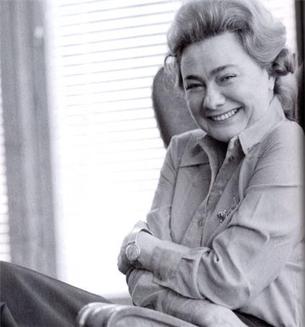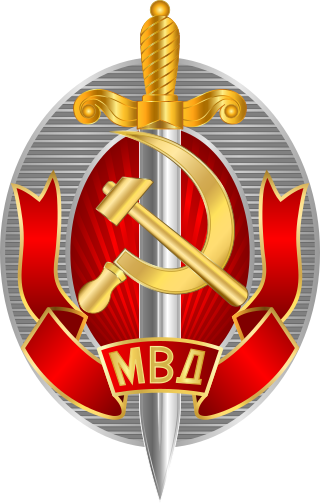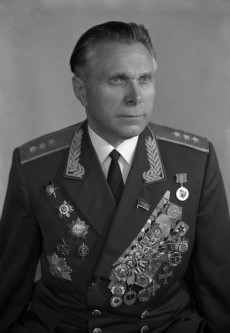Related Research Articles

The history of the Soviet Union from 1982 through 1991 spans the period from the Soviet leader Leonid Brezhnev's death until the dissolution of the Soviet Union. Due to the years of Soviet military buildup at the expense of domestic development, and complex systemic problems in the command economy, Soviet output stagnated. Failed attempts at reform, a standstill economy, and the success of the proxies of the United States against the Soviet Union's forces in the war in Afghanistan led to a general feeling of discontent, especially in the Soviet-occupied Baltic countries and Eastern Europe.

Konstantin Ustinovich Chernenko was a Soviet politician and the seventh General Secretary of the Communist Party of the Soviet Union. He briefly led the Soviet Union from 1984 until his death a year later.

Yuri Vladimirovich Andropov was a Soviet politician who was the sixth leader of the Soviet Union and the fourth General Secretary of the Communist Party of the Soviet Union, taking office in 1982 and serving until his death in 1984.

Leonid Ilyich Brezhnev was a Soviet politician who served as General Secretary of the Communist Party of the Soviet Union from 1964 until his death in 1982, and Chairman of the Presidium of the Supreme Soviet from 1960 to 1964 and again from 1977 to 1982. His 18-year term as General Secretary was second only to Joseph Stalin's in duration. To this day, the value of Brezhnev's tenure as General Secretary remains debated by historians.
Sharof Rashidovich Rashidov was the First Secretary of the Central Committee of the Communist Party of Uzbekistan from 1959 until his death in 1983. During his tenure the Uzbek SSR saw considerable economic growth and had a very high degree of autonomy from the rest of the Soviet Union.

Galina Leonidovna Brezhneva was the daughter of Soviet politician and longtime General Secretary Leonid Brezhnev and Viktoria Brezhneva.

Viktor Mikhailovich Chebrikov was a Soviet public official and security administrator and head of the KGB from December 1982 to October 1988.

Inomjon Buzrukovich Usmonxoʻjayev served as the eleventh First Secretary of the Communist Party of the Uzbek SSR. Usmonxoʻjayev became General Secretary following the disastrous "Cotton Scandal".

The 27th Congress of the Communist Party of the Soviet Union was held from 25 February to 6 March 1986 in Moscow. This was the first congress presided over by Mikhail Gorbachev as General Secretary of the Central Committee of the CPSU. In accordance with the pattern set 20 years earlier by Leonid Brezhnev, the congress occurred five years after the previous CPSU Congress. Much had changed in those five years. Key figures of Soviet politics, Mikhail Suslov, Leonid Brezhnev, Yuri Andropov, Dmitriy Ustinov, and Konstantin Chernenko had died, and Mikhail Gorbachev had become General Secretary of the Party. For this reason the congress was widely anticipated, both at home and abroad, as an indicator of Gorbachev's new policies and directions. The congress was attended by 4993 delegates. It elected the Central Committee of the 27th term.
The People's Control was a semi-civic, semi-governmental organisation in the Soviet Union with the purpose of putting under scrutiny the activities of government, local administrations and enterprises. It traces its roots back to Rabkrin, established in 1920.

Fyodor Davydovich Kulakov was a Soviet statesman during the Cold War.

The Ministry of Internal Affairs of the USSR was the interior ministry of the Soviet Union from 1946 to 1991.

Yuri Leonidovich Brezhnev was a Soviet politician and the son of Soviet politician and longtime Soviet leader Leonid Brezhnev and Viktoria Denisova.
Yuri Mikhailovich Churbanov was a Soviet politician and the son-in-law of longtime General Secretary Leonid Brezhnev.
The full understanding of the history of the late Soviet Union and of its successor, the Russian Federation, requires the assessment of the legacy of Leonid Brezhnev, the third General Secretary of the Central Committee of the Communist Party of the Soviet Union (CPSU) and twice Chairman of the Presidium of the Supreme Soviet. Leonid Brezhnev was the leader of the CPSU from 1964 until his death in 1982, whose eighteen-year tenure has been recognized for developing the most powerful military, and for social and economic stagnation in the late Soviet Union.

Nikolai Anisimovich Shchelokov was a Soviet statesman and army general who served sixteen years as minister of internal affairs from 17 September 1966 to 17 December 1982. He was fired from all posts on corruption charges and committed suicide on 13 December 1984.
The Defence Council or the Council of Defense of the USSR was a high military advisory body which aided and assisted the Government of the Soviet Union and the Central Committee of the Communist Party of the Soviet Union in the implementation of military policy by the Soviet Armed Forces. It operated between 1955-1991. At the end of its existence, it was known as the Defense Council under the President of the Soviet Union.

The Uzbek cotton scandal, also known simply as the cotton scandal or the Uzbek scandal, was a widespread corruption scandal in the Uzbek Soviet Socialist Republic beginning during the later years of the rule of Leonid Brezhnev and continuing until 1989.
References
- ↑ Liu Xianzhong, 苏联时期的腐败及其成因 (Corruption and its causes during the Soviet era)
- ↑ Pavel Sorokun, Исторический очерк возникновения и развития взяточничества и коррупции в России
- ↑ Часть 1. Коррупция в России, from Report "РОССИЯ И КОРРУПЦИЯ: КТО КОГО"
- ↑ Декрет о взяточничестве
- ↑ Финогентова Ольга Евгеньевна, Понятие взятки и ответственность за нее в советском законодательстве 1918-1926 гг
- ↑ Бриллианты и икра
- ↑ "2 High Soviet Officials Are Executed For Graft". The New York Times . 14 January 1984. Retrieved 1 October 2018.
- ↑ Алексей Горшков, Нет повести печальнее на свете
- ↑ Geldern, James von. "Our Little Father". Soviethistory.org. Archived from the original on 22 July 2011. Retrieved 4 February 2011.